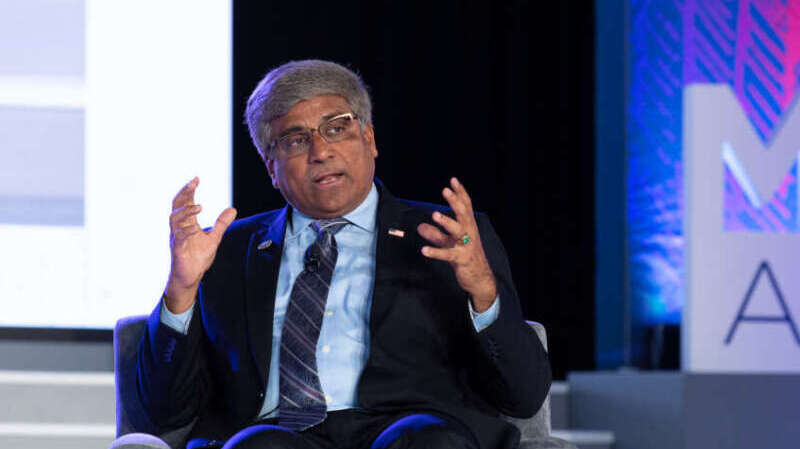
National Science Foundation (NSF) Director Sethuraman Panchanathan urged Congress today to ramp up its investments in critical and emerging technologies, saying he is “extremely worried” the United States is slipping in the global race for technological leadership.
During a House Science, Space, and Technology subcommittee hearing today, the NSF director explained that current spending levels are “nowhere near” where they should be for key technologies such as quantum, AI, and semiconductors.
When asked about how potential budget cuts would impact NSF’s progress, Panchanathan put it simply: “We are handing it to our competitor on a silver platter.”
“This is the time to hyper-compete and invest in the talent and ideas right here in our country,” he stressed. “The more we cut, the more the ideas that are being proposed to NSF in quantum, in AI will not be funded. And guess what, who’s funding them and the people? It is our competitor. Our competitor is now funding those ideas that we don’t fund because we don’t have the resources.”
“This is a national security issue, and this is not something that you should take lightly at all. I’m extremely worried,” Panchanathan told lawmakers.
President Biden’s proposed fiscal year (FY) 2025 budget request for NSF includes $10.2 billion, including almost $300 million for quantum information science. According to Panchanathan, this represents a 30 percent increase in quantum funding from the FY2023 level, but “that’s nowhere near where the appetite is in the nation.”
For example, a recent report from the National Science Board (NSB) – which serves as the governing board of NSF – revealed that the nation’s global tech position is slipping. It found that the share of the total U.S. R&D funded by the Federal government decreased from 30 percent in 2011 to 19 percent in 2021.
Following the report’s release, NSB Chair Daniel Reed said the report makes obvious that the United States relies heavily on “foreign-born STEM talent and is limited by flat Federal R&D investment, all at a time when global innovation continues to accelerate.”
Reed, who also testified at today’s hearing, echoed Panchanathan’s calls for more funding in critical and emerging technologies.
“While other countries invest heavily in the future, our real Federal R&D funding is flat. And we’re failing to develop the domestic STEM workforce needed to remain globally competitive. We’re simply not moving at the speed of our competitors,” Reed told lawmakers.
“So, I’m here today not merely to ask you to fund NSF with the FY25 request level … I’m here to ask for more. I’m asking us to dream better dreams,” he added.
Reed explained that while NSF’s National Artificial Intelligence Research Resource (NAIRR) pilot is “a critical example” of a successful public-private partnership in AI research, “the NAIRR pilot is woefully underfunded.”
In an exclusive interview with MeriTalk last week, Panchanathan voiced the same concern. The director said he wants to ensure that a lack of resources doesn’t become a roadblock to AI innovation or the NAIRR.
“NAIRR is very important, and that’s why there is already work in Congress to see how NAIRR might be more formalized and invested in. I’m very gratified to see that,” Panchanathan told MeriTalk.
“What I would like to see is that resources do not become a constraint for any idea in AI – being able to be taken up and expressed in the fullest form,” he said. “No discovery should be impeded, no translational work should be impeded, and no talent that is ready to engage in AI is not given the opportunity.”
